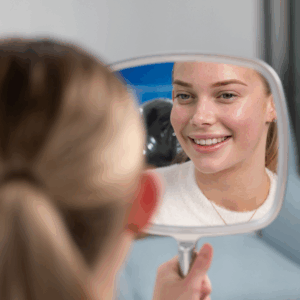4 Common Dental Conditions
1. Tooth Decay
Tooth decay is the holes or cavities in the teeth caused by acid-producing bacteria that live on sugars.
Tooth decay is caused by a combination of various factors. The amount and severity of cavities in your mouth is determined by the balance of several risk factors. The balance of risk factors varies from person to person and throughout a person’s life. For people who are at high risk for tooth decay, regular brushing and flossing will help prevent tooth decay.
The risk of tooth decay is determined by the number and type of cavity-causing bacteria in your mouth. The acids produced by these bacteria are neutralized or buffered by saliva. The mineral composition and hardness of tooth enamel can also influence tooth decay. Poor home dental care and diet can also to tooth decay and cavities.
Tooth decay will result in a cavity in the tooth. The cavity must be removed (drilled out) and the lost tooth structure replaced with a dental restoration. Your dentist may also recommend the use of dental sealants or mild prophylactic fillings on teeth that are at high risk for cavities. There are other important things you can do to reduce your risk of tooth decay.
Items that can be used at home to prevent tooth decay include:
- A mouthwash that reduces the amount of bacteria that cause tooth decay.
- Oral aids such as special lollipops/chewing gum that promote saliva circulation.
- Mineral use of fluoride/calcium/phosphate on teeth to harden enamel
- Products containing xylitol to reduce acid levels in the mouth
- Home Dental Care Guide
- Dental Nutrition Advice
Bacteria that cause cavities eventually enter the tooth’s nerve and blood supply (root canal). If cavities are not treated, bacteria can invade the tooth and cause pain and infection. Root canal treatment will be required. If the cavity is too large, it may be impossible to repair and may require removal.
2. Burning Mouth Syndrome
Burning mouth syndrome is a condition characterised by a persistent burning or fiery sensation in the mouth.
Discomfort can affect various parts of the sot tissues lining the mouth such as the palate, lips, tongue and gums. While the exact cause of this condition is not known, it is often associated with underlying medical conditions such as diabetes, nutritional deficiencies, or hormonal imbalances. Additionally, certain medications, oral habits, and psychological factors like stress or anxiety can contribute to the development of burning mouth syndrome. Despite its name, burning mouth syndrome does not cause visible signs of damage to the mouth, making it a perplexing and challenging condition to diagnose and treat.
Symptoms of burning mouth syndrome include: burning sensation on the tip of the tongue changes in taste for no apparent reason feeling like your mouth is dry
Symptoms of burning mouth syndrome typically last for at least 2 hours a day and for more than 3 months and worsen with each day throughout this period. Symptoms can range from mild to severe. Symptoms may be present continuously or intermittently. Women are more likely to develop burning mouth syndrome than men. Burning mouth syndrome is most common in women aged 50 and over.
There is no known definitive cause of burning mouth syndrome. It is more commonly associated in people with sleep disorders and can be a side effect of certain medications. Burning Mouth Sydnraome is possibly linked to stress, dry mouth, infection, poor diet, dental irritations, and neuropathic pain.
If you have burning mouth syndrome, here are some things you can do about it: Visit your dentist for a check-up and review of your health and dental history. Your dentist may want to refer you to an Oral Pathologist for some tests, such as looking for signs of excessive dryness in your mouth or taking blood samples to test for bacteria, fungi or viruses along with referral to your GP for a medical review.
Buning mouth syndrome can be eased with some medications that can reduce or alleviate the neuropathic pain. Oral Rinses or Soothing Saliva Substitutes can help relieve burning mouth syndrome symptoms. Taking Nutritional Supplements such as Alfa-linoleic Acid can help. Some people find that stress management or counselling can help with their burning mouth syndrome.
3. Tooth Abrasion
Tooth Abrasion refers to the gradual mechanical deterioration of teeth due to foreign objects damaging the tooth surface. Abrasion can occur in a variety of ways, including: V-shaped notches along the gum line The destruction of the teeth’ biting surfaces
Tooth abrasion can be caused by certain dietary habits, such as eating very hard or hard-to-treat foods. In moderation, this is not a cause for concern. However, an excessive consumption of particularly abrasive foods, such as sunflowers, certain grains, and nuts, can cause teeth to become more sensitive to abrasive substances. Toothpaste comes in a variety of abrasiveness levels. Since you are exposed to an abrasive toothpaste every day, it’s important to choose products that will reduce your teeth’ abrasive risk. For example, toothbrushes have extremely hard bristles, and some toothpastes contain extremely abrasive particles. Abrasion is most commonly seen as a bright V-shaped indentation at the gum line of the teeth, resulting in a notched appearance. A destructive diet will also result in a flaking appearance on the chewing surfaces of my back teeth.
Tooth abrasion can be a cause of tooth discoloration. The abrasion is resulting in thinning of the white enamel layer ont eh surface of the tooth. The most effective way to prevent tooth discoloration is to use a toothpaste that is low in abrasive substances. The abrasivity of a tooth is measured in RDA value (Relative Abrasiveness) and ranges from 0 – 250. The harmful RDA values, which are too abrasive, range from 150 – 250. Tooth brushing should be done with a gentle toothbrush and the correct brushing technique with moderate force with toothpaste which is less than 150 abrasivity.
Keep an eye on my teeth to see tooth abrasion is continuing to develop. If there is only a small amount of abrasion, then you may be able to apply fluoride to reduce the chance of decay or sensitivity. In more severe cases, or where decay is present, you may need to see a Dentist for a restoration to be placed. If the tooth is weak or you have an aesthetic concern, then you may need more advanced restorative treatment like a crown, veneer or an onlay.
Given time, Tooth Abrasion will damage the appearance or structure of your teeth and can cause sensitivity, decay and, in extreme cases, tooth loss.
4. Periodontal Disease
When periodontal disease occurs, your body goes through an inflammatory process to try and protect and heal the affected tissues. This inflammation can also affect other parts of your body, including your heart.
The most common symptom of periodontitis is bleeding gums. Bleeding gums may occur when brushing or flossing, which is not considered normal. Other signs of periodontitis include: bad breath, swollen or receding teeth, loose teeth or changes in your bite. Periodontitis is not uncommon and periodontal disease affects approximately 50% of the population of ages 30 and older.
The connection between periodontitis and cardiovascular disease is the inflammation of the gums is closely related to inflammation of the neck and heart arteries. Inflammation is a major factor in destabilising plaque in artery walls. Strokes and heart attacks are caused by the destruction of arterial plaques.
People with periodontitis should undergo a complete physical examination and blood pressure measurement each year. You should also watch for diabetes, high cholesterol, and a family history of early deaths due to cardiovascular disease. Your doctor may suggest lifestyle changes and treatment if necessary.
To keep your periodontal tissue healthy, talk to your dentist about proper home care and an effective teeth cleaning routine. Your dentist may recommend medications such as prescription antimicrobial mouthwashes or oral antibiotics.
Your dentist may also suggest testing your saliva for the presence of certain bacterial oral pathogens and evaluating inflammatory and genetic risk factors. It’s not just about saving your teeth, it’s also about saving your life.
Book a Professional Check-Up and Clean Today
Visit the friendly and experienced team at Brisbane Smiles for a routine Dental Check-Up and Clean appointment in Brisbane to maintain optimal oral health and prevent negative dental conditions from occurring. Book online.




